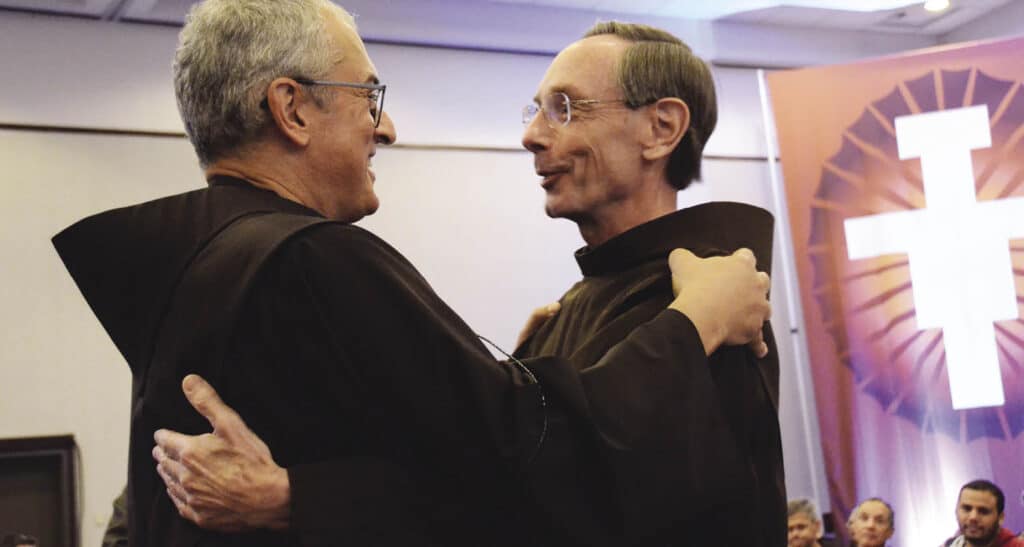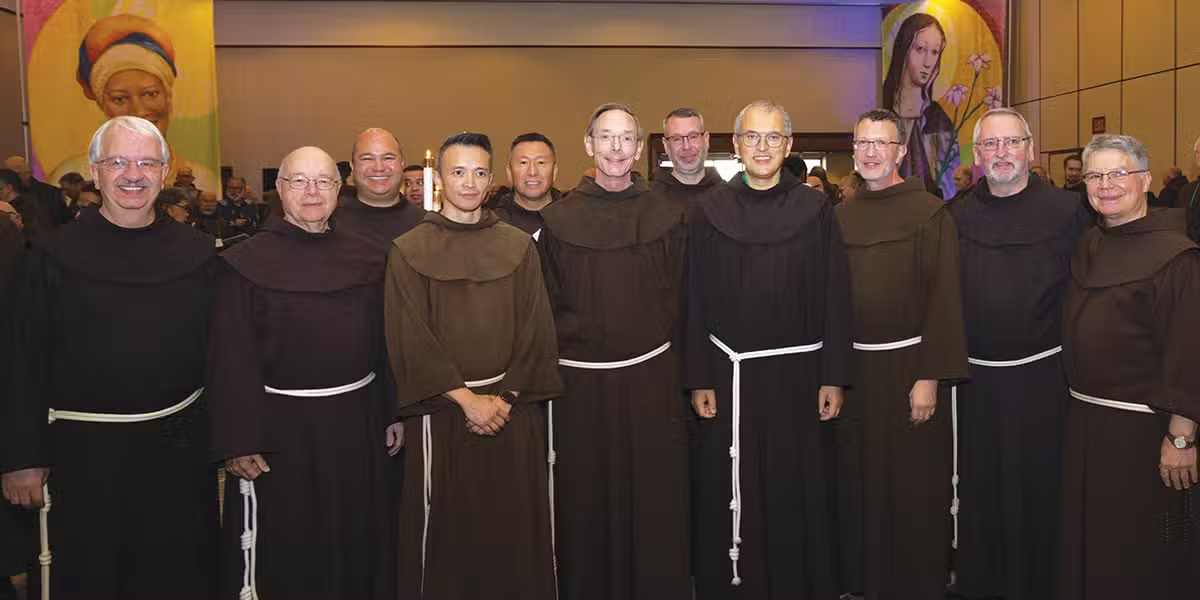In October 2023, Franciscans from a number of US provinces gathered to become one.
Now they are discovering new ways to live out the spirit of St. Francis.
Shortly before his death, St. Francis of Assisi said to his fellow friars, “Let us begin again, for up until now we have done nothing.”
It was a call for the friars to continue spreading the message of the Gospel as they had been, but it was also a call to continually seek new ways in which to do so. Now, 800 years later, the friars, known in their humility as the “lesser brothers,” are still seeking ways to answer that call.
In that spirit, about 700 Franciscans of the Order of Friars Minor (OFM) from several US provinces from across the country came together last October to unify and become the Province of Our Lady of Guadalupe. The unification officially took place during the friars’ Synodal Chapter of Unity, held in Kansas City, Missouri. In establishing the new province, Minister General Brother Massimo Fusarelli installed Brother Lawrence Hayes as the province’s first provincial minister and Brother Mark Soehner as the provincial vicar. Seven councilors were also installed.
Their job, says Brother Lawrence, is “to be stewards of the vision, animators of the brothers, and guardians of the fraternal care of each brother.” That vision, he says, is “how best to live out the Gospel of Christ in fraternity, in minority, in the United States at this time.”
The name of the new province—Our Lady of Guadalupe—was a perfect fit and the desire of the friars, says Brother Lawrence. “Mary has always been the spiritual director of the order. Also, Our Lady of Guadalupe is the patroness of the Americas,” he says. “It reflects our desire to stand with, to work with, to serve with, to learn with and from the poor and the marginalized. I think having the name Our Lady of Guadalupe is a reminder that God chooses the lowly ones, just as Mary chose Juan Diego. So, in a sense it reflects the minority of the friars minor.”
The friars of the new province hail from 26 states, the District of Columbia, and 16 countries.
A Long Process
According to a press release announcing the event: “The unification comes at a time when the world has a deep hunger for St. Francis’ values—his courage as a peacemaker, his compassion for all people and all of creation, and his concern for the poor and the marginalized—all expressions of his profound love for Jesus Christ.
Franciscan friars have devoted their lives to carrying on this legacy through their service to others. Their synodal Chapter of Unity also happened at a time when Pope Francis has been leading the global Catholic Church in refreshing its identity and mission for this era.”
But this has not been a quick or hasty process. “It is something that has been talked about for years and years,” says Brother Lawrence. “What motivated it, realistically speaking, was the decline in the number of Franciscan friars and, with that, a desire to preserve our ability to have a variety of ministries. If you have a pool of guys and you expand the pool, you can still have a variety of ministries.”
Other factors, he says, were a desire to have a more national voice as Franciscans and wanting to reduce the number of friars engaged in internal ministry, such as serving on each individual province’s leadership team.
Brother Jack Clark Robinson, a Franciscan historian and storyteller, says the discussion about unifying the provinces began in 2012 when Brother José Rodríguez Carballo, OFM, the minister general at the time, gathered the provincial leadership to discuss the current state and future of Franciscan life here in the United States.
“[The following year,] the provincial ministers of the provinces accepted the report and its recommendation for a referendum among all the friars about the possibility of ‘coming to the table’ to consider the restructuring of their fraternal governance in the United States to allow and encourage renewal by a better allocation of their resources,” says Brother Jack.
It wasn’t until May 2018, though, that “after much study, deliberation, and discernment, the majority of the provinces voted to seek the suppression of their existing provinces and the establishment of one new province to incorporate the friars who had belonged to them,” he adds.
Different Perspectives, Same Excitement
For the friars, the unification will open up a whole new look at life and ministry. However, for the younger friars, who have gone through initial formation with members of other provinces, the move has not been such a huge step.
One of those friars is Brother John Boissy. Talks of unification began shortly after Brother John joined the order in 2015.
“Having formation with guys from other provinces and getting to know them throughout the process can make it much different for younger friars than it does for some of the older ones. For me—and probably others around my time in formation—it kind of feels like we’ve already been living as one together,” says Brother John.

Minister General Massimo Fusarelli and Provincial Minister Lawrence Hayes of the Province of Our Lady of Guadalupe share a brotherly embrace after Brother Lawrence is installed as provincial minister.
Brother Joe Schwab, who has been a friar for over 45 years, is equally excited about the possibilities the new unified province brings. “Ministries will change,” he says, “because our basic outlook has now been developed into a focus on being part of a Franciscan movement rather than as a province relatively separated from other provinces in strategy, planning, and commitment.”
The change “encourages us to get to know each other better, because we were not normally working together in ministries,” adds Brother Joe. “I find it exciting to think that I could live and work in any part of the country.”
Brother John agrees. “It opens up potential to go to a wider variety of places, but also to do other types of ministry. Now you can collaborate with a wider variety of friars and expand into different areas that weren’t necessarily possible before,” he says.
Making Connections
But with that opportunity for the friars to meet each other on a larger scale comes its challenges. The sheer expanse of the new province is daunting, going from Boston to Santa Barbara and Mississippi to Alaska.
“One of the challenges for us as friars is to feel we belong to something that’s tangible. And part of that will be getting to know one another more than we do now,” says Brother Lawrence. In that spirit, one of the new initiatives in the province is to encourage friars to move around and participate in gatherings outside of where they live.
“I think the more we get to know brothers, the more we’ll feel at home with the new province, the more we’ll recognize how gifted we are with friars from different legacy provinces. There’s such a wealth of talent and spirituality and spirit among us. It’s simply a matter of discovering the gift that is already there—the gift that we are,” he says.
Brother Jack believes that the proactive work of the friars is important. “The great blessing to the friars themselves, to the order, and to the Church in the United States in creating this new province at this moment is that the friars have—under the guidance of the Holy Spirit—taken charge of what is happening rather than simply drifting along.”
New Ways to Minister
Headquarters for the new province are in Atlanta, Georgia, but Brother Lawrence says the friars have a desire to do much more in the area than just house their administrative offices there.
“We’d like to be involved in direct ministry,” says Brother Lawrence. “We have a number of friars who are looking at what possibilities exist for friars” in the area. “Where are the needs?” and “How can we serve?” are the questions the friars are asking, he says.
On a more national scale, Brother Lawrence says the friars will be growing into new ways to minister. There are a number of ideas that have surfaced, he notes, such as ministries on the US-Mexico border and even the idea of a band of itinerant preachers who would travel and minister in various ways, such as retreats. And a new priority in the province, he says, will be finding ways to respond to the ecological crisis, especially in light of Pope Francis’ latest ecological apostolic exhortation, Laudate Deum (Praise God).
Overall, though, he believes that whatever those ministries turn out to be, the future impact of the friars and their ministries will be humble and local. “I think we will have an impact where we are. And I think it will be an impact for the good, because we strive to be a band of brothers that tries to live inclusivity, nonviolence, concern, and compassion for those who would normally be excluded. I think we will be messengers of the joy of the Gospel. I think we’ll try to do that wherever we are and try to make a difference,” he says.
Working with Others
Citing the recent synod of bishops and Pope Francis’ call for synodality, Brother Lawrence says that the friars will need to collaborate more with the laity and the larger Franciscan family. The friars also will have to understand that while at one point they could do it all by themselves, they can no longer do that, nor do they need to.
“There are lots of wonderful groups and organizations doing great work,” says Brother Lawrence. Some of those organizations, he points out, may be outside the Catholic Church. “I think the question is, ‘How can we collaborate more with men and women of goodwill who are already doing good things that we can join with?’ We don’t have to be in charge.
“As [the friars] discern together our priorities, our future, our path forward, I welcome the ability to do that with women, with laity, with the Secular Franciscans, with Poor Clares,” says Brother Lawrence. “I look forward to doing that. We need it.”








